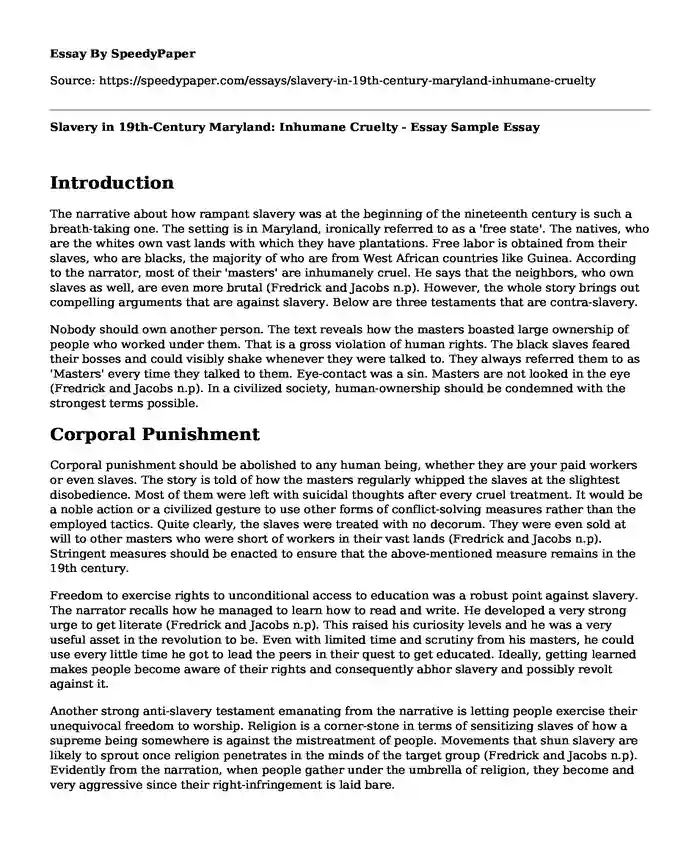Introduction
The narrative about how rampant slavery was at the beginning of the nineteenth century is such a breath-taking one. The setting is in Maryland, ironically referred to as a 'free state'. The natives, who are the whites own vast lands with which they have plantations. Free labor is obtained from their slaves, who are blacks, the majority of who are from West African countries like Guinea. According to the narrator, most of their 'masters' are inhumanely cruel. He says that the neighbors, who own slaves as well, are even more brutal (Fredrick and Jacobs n.p). However, the whole story brings out compelling arguments that are against slavery. Below are three testaments that are contra-slavery.
Nobody should own another person. The text reveals how the masters boasted large ownership of people who worked under them. That is a gross violation of human rights. The black slaves feared their bosses and could visibly shake whenever they were talked to. They always referred them to as 'Masters' every time they talked to them. Eye-contact was a sin. Masters are not looked in the eye (Fredrick and Jacobs n.p). In a civilized society, human-ownership should be condemned with the strongest terms possible.
Corporal Punishment
Corporal punishment should be abolished to any human being, whether they are your paid workers or even slaves. The story is told of how the masters regularly whipped the slaves at the slightest disobedience. Most of them were left with suicidal thoughts after every cruel treatment. It would be a noble action or a civilized gesture to use other forms of conflict-solving measures rather than the employed tactics. Quite clearly, the slaves were treated with no decorum. They were even sold at will to other masters who were short of workers in their vast lands (Fredrick and Jacobs n.p). Stringent measures should be enacted to ensure that the above-mentioned measure remains in the 19th century.
Freedom to exercise rights to unconditional access to education was a robust point against slavery. The narrator recalls how he managed to learn how to read and write. He developed a very strong urge to get literate (Fredrick and Jacobs n.p). This raised his curiosity levels and he was a very useful asset in the revolution to be. Even with limited time and scrutiny from his masters, he could use every little time he got to lead the peers in their quest to get educated. Ideally, getting learned makes people become aware of their rights and consequently abhor slavery and possibly revolt against it.
Another strong anti-slavery testament emanating from the narrative is letting people exercise their unequivocal freedom to worship. Religion is a corner-stone in terms of sensitizing slaves of how a supreme being somewhere is against the mistreatment of people. Movements that shun slavery are likely to sprout once religion penetrates in the minds of the target group (Fredrick and Jacobs n.p). Evidently from the narration, when people gather under the umbrella of religion, they become and very aggressive since their right-infringement is laid bare.
Conclusion
In conclusion, the plight of slaves can never and will never be ignored. Slavery should be abolished completely in this modern society.
Work Cited
Douglass, Frederick, and Harriet A. Jacobs. Narrative of the Life of Frederick Douglass, anAmerican slave. Random House Digital, Inc., 2000.
Cite this page
Slavery in 19th-Century Maryland: Inhumane Cruelty - Essay Sample. (2023, Sep 14). Retrieved from https://speedypaper.net/essays/slavery-in-19th-century-maryland-inhumane-cruelty
Request Removal
If you are the original author of this essay and no longer wish to have it published on the SpeedyPaper website, please click below to request its removal:
- Essay Sample for Free: Political Reasoning Behind the Public Policy
- Essay Sample Dedicated to Lalla Essaydi, A Female Artist
- Free Essay on Media Violence: Does Media Violence Cause Violent Behavior?
- Essay Example - Feminism in Henrik Ibsen's "A Doll's House"
- Analyzing Persuasion Through Ethos, Pathos, and Logos in Drew Dudley's TED Talk - Free Report
- How Population Trends Exist in Marion and Harrison County. Essay Example
- Essay Sample on Asian American History - Asiatic Exclusion League
Popular categories





